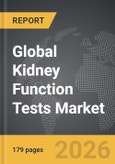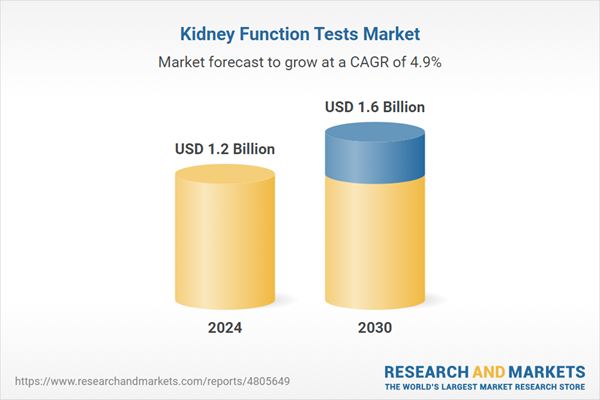Global Kidney Function Tests Market - Key Trends & Medical Insights
Why Are Kidney Function Tests Crucial for Early Detection of Renal Diseases?
Kidney function tests are essential diagnostic tools used to assess how well the kidneys are working and to detect any signs of kidney disease or dysfunction at an early stage. These tests typically measure parameters such as serum creatinine, blood urea nitrogen (BUN), glomerular filtration rate (GFR), and urine albumin, which provide crucial insights into kidney health. Early detection of kidney issues through these tests is vital because chronic kidney disease (CKD) often progresses silently, with symptoms only becoming apparent in advanced stages. Early diagnosis enables timely intervention, which can slow disease progression, prevent complications, and improve patient outcomes. The rising prevalence of conditions such as diabetes and hypertension, which are major risk factors for kidney disease, is driving the demand for routine kidney function testing as part of regular health check-ups and chronic disease management.How Are Technological Advancements Enhancing Kidney Function Tests?
Technological advancements are significantly enhancing the accuracy, convenience, and accessibility of kidney function tests. Innovations in diagnostic technology, such as point-of-care testing devices, are enabling rapid and reliable kidney function assessments outside of traditional laboratory settings, making it easier for healthcare providers to monitor patients in real-time. The development of advanced biomarkers that provide more precise information about kidney damage and function is also improving the sensitivity of these tests, allowing for earlier detection of kidney disease. Additionally, the integration of kidney function testing with digital health platforms and electronic medical records (EMRs) is streamlining data management, enabling healthcare professionals to track patient progress more effectively and make informed treatment decisions. These advancements are particularly beneficial in managing chronic conditions and reducing the burden of kidney disease on healthcare systems.What Challenges Are Present in the Kidney Function Tests Market?
The kidney function tests market faces several challenges, including disparities in access to testing, the complexity of interpreting results, and the need for better public awareness. In many parts of the world, especially in low-resource settings, access to advanced kidney function tests is limited, which can delay diagnosis and treatment of kidney disease. Additionally, interpreting the results of these tests can be complex, particularly in cases where multiple factors affect kidney function, such as in elderly patients or those with comorbidities. This complexity can lead to misdiagnosis or underdiagnosis if not handled by experienced healthcare providers. Moreover, there is a lack of public awareness about the importance of regular kidney function testing, especially among individuals at higher risk of kidney disease. To address these challenges, efforts are being made to improve access to testing through mobile health units, telemedicine, and community health programs, while also educating the public about the importance of kidney health and early detection.What Factors Are Driving Growth in the Kidney Function Tests Market?
The growth in the kidney function tests market is driven by several factors, including the increasing prevalence of chronic kidney disease (CKD), advancements in diagnostic technologies, and the growing emphasis on preventive healthcare. The rising incidence of diabetes, hypertension, and other conditions that can lead to kidney damage is a major driver of the demand for regular kidney function testing. Technological advancements, such as the development of more accurate and rapid testing methods, are making these tests more accessible and reliable, further supporting market growth. Additionally, the shift towards preventive healthcare, where early detection and management of potential health issues are prioritized, is driving the integration of kidney function tests into routine medical screenings. The expansion of healthcare infrastructure in emerging markets and the growing availability of point-of-care testing solutions are also contributing to the market's expansion. As awareness of kidney health increases and access to testing improves, the kidney function tests market is expected to continue growing.Report Scope
The report analyzes the Kidney Function Tests market, presented in terms of market value (USD). The analysis covers the key segments and geographic regions outlined below.- Segments: Product (Dipsticks, Disposables, Reagents); Test Type (Clearance Tests, Blood Tests, Urine Tests, Dilution & Concentration Tests, Other Test Types); End-Use (Hospitals, Diagnostic Centers, Research Laboratories & Institutes, Other End-Uses).
- Geographic Regions/Countries: World; United States; Canada; Japan; China; Europe (France; Germany; Italy; United Kingdom; and Rest of Europe); Asia-Pacific; Rest of World.
Key Insights:
- Market Growth: Understand the significant growth trajectory of the Dipsticks segment, which is expected to reach US$765 Million by 2030 with a CAGR of 5.4%. The Disposables segment is also set to grow at 4.6% CAGR over the analysis period.
- Regional Analysis: Gain insights into the U.S. market, valued at $321.2 Million in 2024, and China, forecasted to grow at an impressive 4.6% CAGR to reach $244.4 Million by 2030. Discover growth trends in other key regions, including Japan, Canada, Germany, and the Asia-Pacific.
Why You Should Buy This Report:
- Detailed Market Analysis: Access a thorough analysis of the Global Kidney Function Tests Market, covering all major geographic regions and market segments.
- Competitive Insights: Get an overview of the competitive landscape, including the market presence of major players across different geographies.
- Future Trends and Drivers: Understand the key trends and drivers shaping the future of the Global Kidney Function Tests Market.
- Actionable Insights: Benefit from actionable insights that can help you identify new revenue opportunities and make strategic business decisions.
Key Questions Answered:
- How is the Global Kidney Function Tests Market expected to evolve by 2030?
- What are the main drivers and restraints affecting the market?
- Which market segments will grow the most over the forecast period?
- How will market shares for different regions and segments change by 2030?
- Who are the leading players in the market, and what are their prospects?
Report Features:
- Comprehensive Market Data: Independent analysis of annual sales and market forecasts in US$ Million from 2024 to 2030.
- In-Depth Regional Analysis: Detailed insights into key markets, including the U.S., China, Japan, Canada, Europe, Asia-Pacific, Latin America, Middle East, and Africa.
- Company Profiles: Coverage of players such as 77 Elektronika Kft., Abbott Laboratories, Acon Laboratories, Inc., Arkray, Inc., Beckman Coulter, Inc. and more.
- Complimentary Updates: Receive free report updates for one year to keep you informed of the latest market developments.
Some of the 12 companies featured in this Kidney Function Tests market report include:
- 77 Elektronika Kft.
- Abbott Laboratories
- Acon Laboratories, Inc.
- Arkray, Inc.
- Beckman Coulter, Inc.
- F. Hoffmann-La Roche AG
- Nova Biomedical Corporation
- Opti Medical Systems, Inc.
- Randox Laboratories Ltd.
- Siemens Healthineers
- Sysmex Corporation
- Urit Medical
This edition integrates the latest global trade and economic shifts into comprehensive market analysis. Key updates include:
- Tariff and Trade Impact: Insights into global tariff negotiations across 180+ countries, with analysis of supply chain turbulence, sourcing disruptions, and geographic realignment. Special focus on 2025 as a pivotal year for trade tensions, including updated perspectives on the Trump-era tariffs.
- Adjusted Forecasts and Analytics: Revised global and regional market forecasts through 2030, incorporating tariff effects, economic uncertainty, and structural changes in globalization. Includes historical analysis from 2015 to 2023.
- Strategic Market Dynamics: Evaluation of revised market prospects, regional outlooks, and key economic indicators such as population and urbanization trends.
- Innovation & Technology Trends: Latest developments in product and process innovation, emerging technologies, and key industry drivers shaping the competitive landscape.
- Competitive Intelligence: Updated global market share estimates for 2025, competitive positioning of major players (Strong/Active/Niche/Trivial), and refined focus on leading global brands and core players.
- Expert Insight & Commentary: Strategic analysis from economists, trade experts, and domain specialists to contextualize market shifts and identify emerging opportunities.
Table of Contents
Companies Mentioned (Partial List)
A selection of companies mentioned in this report includes, but is not limited to:
- 77 Elektronika Kft.
- Abbott Laboratories
- Acon Laboratories, Inc.
- Arkray, Inc.
- Beckman Coulter, Inc.
- F. Hoffmann-La Roche AG
- Nova Biomedical Corporation
- Opti Medical Systems, Inc.
- Randox Laboratories Ltd.
- Siemens Healthineers
- Sysmex Corporation
- Urit Medical
Table Information
| Report Attribute | Details |
|---|---|
| No. of Pages | 179 |
| Published | January 2026 |
| Forecast Period | 2024 - 2030 |
| Estimated Market Value ( USD | $ 1.2 Billion |
| Forecasted Market Value ( USD | $ 1.6 Billion |
| Compound Annual Growth Rate | 4.9% |
| Regions Covered | Global |









